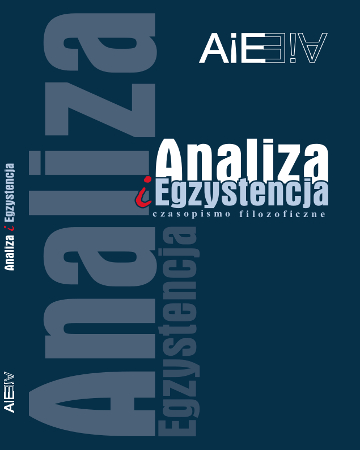
ISSN: 1734-9923
eISSN: 2300-7621
OAI






Lista wydań /
29 (2015)
Kripkeański Wittgenstein, faktualizm i znaczenie
| Autorzy: |
Adam
Łukasik
Alexander Miller Department of Philosophy, University of Otago, New Zealand |
| Słowa kluczowe: | Kripke, Kripkeański Wittgenstein, George Wilson, faktualizm w kwestii znaczenia, fakt znaczeniowy |
| Data publikacji całości: | 2015 |
| Liczba stron: | 39 (5-43) |
Abstrakt
The paper provides a detailed discussion of George Wilson’s factualist interpretation of Saul Kripke’s Wittgenstein on Rules and Private Language and presents a new non-factualist interpretation. After exposition of Wilson’s construal of Kripke’s Wittgenstein’s sceptical argument and sceptical solution, it is argued that this interpretation ultimately fails. Two possible interpretations of Wilson’s Kripke’s Wittgenstein’s meaning-fact are considered; one of them is based on Kripke’s Wittgenstein’s remarks on normative conditionals, and the other involves minimalism. It is claimed that on either of these interpretations the meaning-fact proposed by Wilson falls prey to Kripke’s Wittgenstein’s sceptical argument. Regardless of this, it is admitted that Wilson’s factualist interpretation has important advantages. One of them is that it highlights the importance of distinguishing between basic sceptical conclusion and radical sceptical conclusion. In concluding sections a new non-factualist interpretation of Kripke’s Wittgenstein is proposed that preserves this distinction and some other benefits claimed by Wilson for his interpretation.
Pobierz plik
Plik artykułu
Bibliografia
| 1. | Ayer A.J. (1936), Language, Truth and Logic, London: Gollancz. |
| 2. | Blackburn S. (1984), Spreading The Word: Groundings in the Philosophy of Lan- guage, Oxford: Oxford University Press. |
| 3. | Boghossian P. (1989), The Rule-Following Considerations, [w:] Rule-Following and Meaning, A. Miller, C. Wright (red.), Chesham: Acumen 2002, s. 141–187. |
| 4. | Byrne A. (1996), On Misinterpreting Kripke’s Wittgenstein, „Philosophy and Phe- nomenological Research” 56, s. 339–343. |
| 5. | Davies D. (1998), How Sceptical is Kripke’s ‘Sceptical Solution’?, „Philosophia” 26, s. 119–140. |
| 6. | Haukioja J. (2000), Rule-Following, Response-Dependence and Realism, Turku: University of Turku. |
| 7. | Jackson F., Oppy G., Smith M. (1994), Minimalism and Truth-Aptness, „Mind” 103, s. 287–302. |
| 8. | Kripke S. (2007), Wittgenstein o regułach i języku prywatnym: wykład wprowadza- jący, tłum. K. Posłajko i L. Wroński, Warszawa: Fundacja Aletheia. |
| 9. | Kusch M. (2006), A Sceptical Guide to Meaning and Rules: Defending Kripke’s Wittgenstein, Chesham: Acumen. |
| 10. | McGinn C. (1984), Wittgenstein on Meaning: An Interpretation and Evaluation, Oxford: Blackwell. |
| 11. | Miller A. (2007), Philosophy of Language, wyd. 2, London: Routledge. |
| 12. | Miller A.(2010), Rule-Following Skepticism, [w:] The Routledge Companion to Epistemology, S. Bernecker, D. Pritchard (red.), London: Routledge, s. 454–463. |
| 13. | Miller A., Wright C. (red.), (2002), Rule-Following and Meaning, Chesham: Acumen. Travis C. (2006), Thought’s Footing: A Theme in Wittgenstein’s Philosophical |
| 14. | Investigations, Oxford: Oxford University Press. |
| 15. | Wilson G. (1994), Kripke on Wittgenstein on Normativity, [w:] Rule-Following and |
| 16. | Meaning, A. Miller, C. Wright (red.), Chesham: Acumen 2002, s. 234–259. Wilson G. (1998), Semantic Realism and Kripke’s Wittgenstein, „Philosophy and |
| 17. | Phenomenological Research” 58, s. 99–122. |
| 18. | Wilson G. (2003), The Skeptical Solution, [w:] The Legitimacy of Truth. Proceed- ings of the III Meeting Italian-American Philosophy – Rome 2001, R. Dottori (red.), Münster: LIT Verlag, s. 171–188. |
| 19. | Wilson G. (2006), Rule-Following, Meaning, and Normativity, [w:] The Oxford Handbook of Philosophy of Language, E. LePore, B. Smith (red.), Oxford: Oxford University Press, s. 151–174. |
| 20. | Wright C. (1984), Kripke’s Account of the Argument against Private Language, [w:] tegoż, Rails to In nity: Essays on Themes From Wittgenstein’s Philosophical Investigations, Cambridge MA: Harvard University Press 2001, s. 91–115. |
| 21. | Wright C. (1992), Truth and Objectivity, Cambridge MA: Harvard University Press. Wright C. (2003), Saving The Differences: Essays on Themes from ‘Truth and Objectivity’, Cambridge MA: Harvard University Press. |